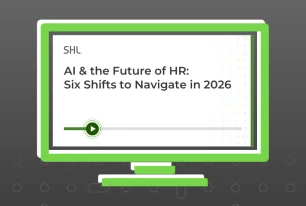Five Timeless Skills Driving HR Success
Over the past decade, the skills required for success in HR have become more streamlined, emphasizing quality over quantity and incorporating new proficiencies such as digital literacy. However, with research spanning the last decade, SHL has uncovered five behavioral skills that are crucial to success, and projected to stay that way.
Share
What skills stand the test of time for HR success?
With greater change on the horizon, driven by advancements in technology, AI, and an increasing emphasis on creativity and adaptability, what is essential to succeed in HR today?
SHL conducted research to investigate the key skills that have stood the test of time, maintaining their importance over the last decade despite shifts in other priorities. In our study, five foundational skills consistently emerged as timeless pillars of HR success.
1) Adapts to change
HR employees skilled in this area stay productive, drive flexibility, and effectively lead teams through changing workplaces, organizational restructures and business transformation.
2) Applies functional expertise
Professionals strong in this area deliver HR expertise with technical excellence, using technology and specialist knowledge in talent acquisition, talent management, and L&D. They act as trusted advisors, guiding teams through complex HR challenges.
3) Demonstrates empathy
Those who excel in this skill show compassion by recognizing emotional cues and providing timely support to colleagues, fostering effective collaboration across the organization.
4) Encourages diversity
HR employees with this skill encourage an inclusive workplace in which skills and knowledge from diverse range of people are accepted and appreciated. They also promote the recruitment, support, and development of employees to maximize inclusivity in the workplace.
5) Focuses on self-development
Professionals strong in this skill actively seek ways to improve, gain experience across HR functions, and identify their development needs. They learn from experience and proactively address their growth and strength areas.
What do these trends mean for HR leaders?
Understanding the core skills which remain crucial to success in HR positions across time can help HR leaders future-proof their workforce, setting their employees up to remain effective and resilient across time. Here are three drivers for success:
Purpose-driven recruitment
Establish high performing teams by focusing on candidates who demonstrate adaptability, functional expertise, and a growth mindset throughout the selection process.
- Action Tip 1: Focus on identifying and selecting candidates who can fill skills gaps within your team.
- Action Tip 2: Use the right recruitment tools to encourage a wide talent pool.
- Action Tip 3: Harness the power of talent data within your organization to drive accurate, fair talent decision-making.
Future-focused, inclusive culture
Foster environments that encourage collaboration, celebrate innovation, and promote diverse thinking to nurture a forward-thinking mindset and support employees in developing empathy and inclusion skills.
- Action Tip 1: Encourage your HR team to work with other departments to develop a cross-functional problem-solving approach.
- Action Tip 2: Leverage the right technology, tools and AI, to create efficiencies in human capital practices, freeing up time for your employees to develop inclusive, empathetic mindsets.
- Action Tip 3: Develop policies that encourage flexibility and help your team engage with distributed workforces while maintaining their productivity and collaboration.
Dynamic development and upskilling
Encourage continuous improvement by establishing learning pathways that allow employees to engage in self-development.
- Action Tip 1: Empower employees to take control of their own development by helping them identify their skills gaps, strengths, self-development goals, and learning pathways.
- Action Tip 2: Establish upskilling and reskilling opportunities which are aligned with future business demands and make them accessible to your team.
- Action Tip 3: Champion self-development by leading by example. Prioritize leadership development programs that emphasize emotional intelligence, inclusivity, and adaptability.
Read our full HR Skills Insights Report for more information about the skills critical for success in HR, how these vary across region and job-level, and how HR leaders can build future-focused teams.









